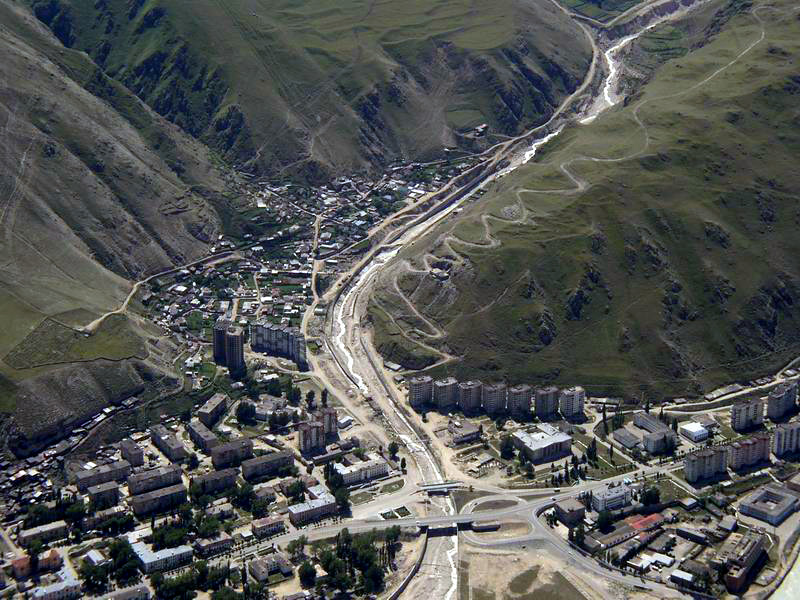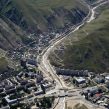
Tensions Flare in a Kabardino-Balkaria Resort Populated by the Balkar Minority
Publication: Eurasia Daily Monitor Volume: 6 Issue: 115
By:

On June 12 hundreds of protesters in the Elbrus district of Kabardino-Balkaria blocked the highway that connects this mountainous resort region with the republic’s lowlands. The protestors were current and former tourist industry employees demanding shares in a tourist company, a just distribution of land and a shrinking of the border security zone (Kavkazsky Uzel, June 12). Kabardino-Balkaria President Arsen Kanokov visited with the protestors himself to try and calm them down, and managed to persuade them to unblock the roads (Interfax, June 12).
Mount Elbrus and its environs are considered the most attractive place in the republic for tourists from Russia as well as from abroad. Elbrus is the highest mountain in the Caucasus and in Europe. One of Russia’s oligarchs, Vladimir Potanin, pledged $1 billion in investment into the Elbrus tourism business in 2007. Some Italian and Austrian investors also indicated interest to the region. Even though the economic crisis has cast doubt on the short-term prospects of investment in the region, in the long run Elbrus is likely to attract investment again.
The Elbrus area of Kabardino-Balkaria borders Georgia and is traditionally inhabited by the Balkars, one of the Turkic-speaking peoples of the Caucasus, who are a minority in Kabardino-Balkaria. The Balkars are nearly identical to the Karachais, who in turn occupy commanding political positions in the neighboring republic of Karachaevo-Cherkessia. Tensions between the Balkars and the authorities of Kabardino-Balkaria, which is dominated by the ethnic Kabardins, were especially high at the beginning of the 1990’s, when the Balkars demanded separation from Kabardino-Balkaria. The Balkars make up less than 12 percent of the total population of the republic – 900,000, while the Kabardins make up 55 percent and ethnic Russian 25 percent. In the past several years the issue of power sharing between the Balkars and the Kabardins has again become highly contested.
In January 2008 the Supreme Court of Kabardino-Balkaria ruled that the Council of Balkar People’s Elders, a vanguard Balkar organization, should be dissolved, labeling it as "extremist." Russia’s Supreme Court overturned that decision two months later and eventually the Council stayed afloat, even though its leaders were attacked several times. One isolated version of the course of events put forward by the newspaper Izvestia alleged that Balkars are used by powerful Kabardin clans in their own interests. The publication specifically pointed to the Kabardin businessman and powerful political figure Valery Kardanov from the team of Russia’s former president, Vladimir Putin. Valery Kardanov owns an oil company that is affiliated with the state’s Rosneft oil company (Izvestia, December 18, 2008).
However, even if they are supported by a Kabardin businessman, the Balkars have had long lists of grievances, complaining about not having influence on the decision-making process in Kabardino-Balkaria and therefore feeling vulnerable before the Kabardin majority (www.balkaria.info, January 31). The Balkars started to voice their concerns most actively after Arsen Kanokov came to power in Kabardino-Balkaria in 2005. Their main demand was to have control over the recreational zone in the republic’s mountains, where the Balkars have traditionally lived. Lately they have extended their demands, and now want the federal authorities to amend the federal law that expanded border security zones in March 2006. The expansion of the border security zone throughout Russia made the zone as big as it was during the Soviet period (Kommersant, August 2, 2006). As a result of that expansion, large chunks of the tourist attractions in the Caucasus Mountains became inaccessible because the border runs along the mountain range. Since 2006 some adjustments have been made to the law. However, in the Northern Caucasus, where the Russian authorities are especially worried about insurgency and the reliability of the local populations in general, the security zone stayed the same, with it being expanded in many areas to 30 kilometers from the border.
The day before the mass protests in the Elbrus district another incident with possible insurgent involvement took place in the administrative center of the district town of Tyrnyauz. It was not immediately clear whether the explosion and the attack on the policemen that followed it were organized by insurgents or mere criminals. Tyrnyauz hosts a large but dormant factory, which has also been contested by various factions in the republic (Regnum news agency, June 11).
As the economic crisis unravels and Kabardino-Balkaria’s dependence on funds provided by Moscow increases, ethnic-based conflicts are likely to increase in scope and scale. Since control over budget funds and power decide everything in the highly non-democratic environment of Kabardino-Balkaria, the stakes are immensely high, as the winner literally takes all. This will be further complicated by the Islamic insurgency in the region, which has a strong presence in the republic. Kabardino-Balkaria is still grappling with the aftermath of the insurgent attack on the capital city Nalchik in October 2005. Around two hundred young, inexperienced militants attacked several official buildings, but were quickly defeated by the federal and local law enforcement authorities.
The reemergence of nationalism as the catalyst driving social changes in the region may be another trend, one manifested in newly-found divisions between the Kabardins and the Balkars. While Moscow was quick to announce the "death of nationalism" in Russia and specifically in the North Caucasus, instead conveniently reframing the whole insurgency in the North Caucasus as a "branch of pan-Islamic terrorism," there are many indicators showing that nationalist discourse has remained an important, perhaps even dominant factor in the North Caucasus. And the more successful the authorities are in suppressing the militants, the more likely it is that nationalism will re-emerge as the major engine of change in the region.




